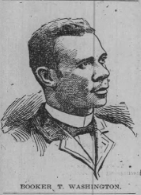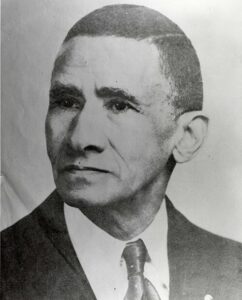Once upon a time in Black Entrepreneur History lived an African American man named Thomas Fortune, born Timothy Thomas Fortune, who became co-owner and editor/publisher of The New York Age, also known as The Colored Age newspaper, one of the largest Black-owned newspapers of its time. Fortune was also the founder of the African American League.
Timothy Thomas Fortune was born in Mariana, Florida in the year of 1856, the year prior to the Dred Scott Decision which argued that African Americans could not be citizens of the USA, upheld slavery and made the Missouri Compromise unconstitutional. He was an African American who reportedly had “Negro, Indian and Caucasian blood”[1]. He viewed life in full liberty for all mankind, and that includes women. His parents[5] were Emanuel Fortune and Sarah Jane Allen Fortune.
Many articles say that Timothy Thomas Fortune was descended from enslaved, however, according to his own New York Age newspaper, he had not descended from enslaved Fortunes, but the grandchild of a free born Fortune. It was common that Timothy Thomas Fortune be confused with another man named Thomas Fortune Ryan as stated below in the quote:
“The Press mixes fact and fiction when it says: “The able and gentlemanlike Negro editor, T. Thomas Fortune, who looks like an Indian, must have descended from slaves in Virginia owned by the Thomas Fortunes.“
“No; our Mr. Fortune is not “descended from Virginia slaves owned by the Thomas Fortunes“. His grandfather was a free born Thomas Fortune of Virginia who went to Florida about 1854. He was a mettlesome man, with an Irishman’s love of scrap, in one which he was killed by a man who managed to get the drop on him. Our Mr. Fortune never knew his grandfather nor felt the need of him or his Virginia relatives, the Thomas Fortunes.”
We notice with interest that the Press speaks of Thomas F. Ryan, the Virginia financier who sleeps in New York, as Thomas Fortune Ryan. So. We are glad that there is room a plenty in New York for Timothy Thomas Fortune and Thomas Fortune Ryan.”
The New York Age 06 Jul 1905, Thu · Page 4
According to the census reports, his parents were both laborers, his father from Florida and mother from Virginia, therefore, it’s unclear, though he was born during the times of slavery, if he was in fact enslaved. Census reports generally wrote in laborer for enslaved, however. If he was ever enslaved, he wasn’t enslaved with laborious tasks ever because slavery was abolished six years after his birth. The above quote could also only mean that his paternal lineage wasn’t enslaved at a point, however, in the South, his father could have easily been enslaved through many factors, as well as his mother.
By the age of twelve, he had a job as a page, delivering correspondence to legislators, in Florida legislature, and later he went enrolled himself at Howard University. From there, he’d become a journalist and became a major player in the reconstruction, forming relationships with all of the powerful African American civil rights activists and politicians. To some, according to the Richmond Planet of 1928, he was “the best developed journalist” of the African American race in the world, stating that “his pen knew but one theme – the right of man” and “for a season, bridging the decline of Douglass and the rise of Booker T. Washington, he was the most influential Negro of the nation.[1]“
He was an African American journalist and civil rights activist in the late 1800s through early 1900s, founding what is known as the New York Age newspaper. It was one of the most read African American newspapers of that time. At the beginning of his journalistic career, Fortune worked at The Mariana Courier, and it was in the year 1880 that he created The Globe publication and first African American newspaper in New York which is known as The New York Age, becoming known as the “ablest Negro editor in America[2]” while also becoming an author of the book titled Black and White: Land, Labor and Politics in the South.
While his career had shaped up well, he was also married to an African American woman named Carrie Fortune, and they had a daughter Aubrey Browser. As a family, they lived in Brooklyn, New York[3]

.
Timothy Thomas Fortune’s Political Equity Views
Timothy Thomas Fortune was a civil rights activist, and stood for not only African American rights but women’s rights as well. His views on political equity were not always enjoyed by many, but being a man who stood by his convictions, he never stood down on what he believed.
In 1895, The Boston Globe reports Fortune as speaking up for women’s rights and the political economy:
“It is a fact that while we talk about political equality, it does not exist today in the United States. In Massachusetts, we do not have it. Political equality is obtaining less and less yearly. Man laid down the political form of government for his participation, and did not mean to include women. Women should have in politics what she wants if it is possible to give it to her, but if you are going to have a share in the government, you must assume your equality of obligation. I think that in the school and liquor license system of Boston, women should have a vote because their influence there would be beneficial.”
The Boston Globe 31 Jul 1895, Wed · Page 10
Timothy Thomas Fortune was also the founder of the African American League which was a precursor to the NAACP and designed as an organization to solidify African American unity and strength. Fortune was also appointed special ambassador to the Philippines by President Theodore Roosevelt.
Timothy Thomas Fortune’s Home in New Jersey
It was in the year 1901 that he bought a large home located on Drs. Parker Boulevard in Red Bank, utilizing his home as his place of work as well when it came to editing the paper.
His home is one of the places needing to be preserved as a historic site in the state of New Jersey, dedicated to the life of this great African American journalist. The Thomas Fortune house committee was formed by members of the church and community members, members of the Red Bank Historic Preservation Committee and more in order to save this endangered property which is worth 1.5 million dollars.[4] The goal is to preserve the historical aspect of the house, no matter what the next intended use may be.
Timothy Thomas Fortune’s Death
Timothy Thomas Fortune passed away on June 2, 1928 as the editor of the New York World of a heart attack after having nonsurgical treatment for about one week. His heart attack was not preceded by any illness.
Timothy Thomas Fortune Honored as Peace Hero
After Fortune’s death, it was in 1937 that the Commission on International Justice and Goodwill of the Brooklyn Church and Mission Federation (Boro Federation) elected their first African American man as peace hero. That man was Timothy Thomas Fortune, and he was honored on Memorial Day (a holiday founded by African Americans). It was the sixth annual peace hero Memorial Day celebration at that time.
Sources:
- Richmond Planet 16 Jun 1928, Sat · Page 8
- The Topeka Plaindealer 26 May 1899, Fri · Page 2
- The Brooklyn Daily Eagle 29 May 1937, Sat · Page 7
- Asbury Park Press 01 Aug 2007, Wed · Page 6
- The New York Age 06 Jul 1905, Thu · Page 4





More Related Stories
Isaac Scott Hathaway – Founder of Isaac Hathaway Art Company & Designer of First African American Coin
James Wormley – Founder of the Most Expensive Hotel in Washington D.C. in 1800s – the Wormley Hotel
William E. Matthews – Wealthy Financial Broker & Civil Rights Leader of 1800s